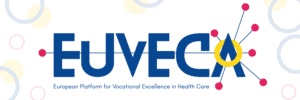Regional Meeting Brings Together Local Health and Education Stakeholders
On February 6th, the Italian partners from the EUVECA project: the Autonomous Province of Trento (PAT) and the Bruno Kessler Foundation (FBK) organised their first regional meeting involving all the various local stakeholders involved with healthcare, academic, lifelong learning, and professional training. This meeting was unique as it was the first time all these local actors were brought together.
All the representatives of the health and social professions were present; the institutions providing continuous education in medicine in Trentino (about 30), including the Local Health Care Trust, representatives of various health and social care professional orders, public and private bodies and associations accredited to provide lifelong learning education courses in medicine, representatives of the School for Medicine and Surgery, the School of General Medicine, the Health professions hub, the Trentino School of Management, TrentinoSalute4.0 (the Competence Centre on digital health of the Trentino region) and a representing person from ProMIS (ProMIS is the national coordination body of the network of Italian Regions for the healthcare sector, with the mission of bringing the Italian regional healthcare systems into Europe and the European healthcare systems in Italy).

Italian Hub for Educational Excellence in Healthcare
During this meeting, the 23 stakeholders in attendance were invited to participate in the Italian Hub for Educational Excellence in Health Care. The Italian partners explained how the EUVECA project intends to offer a unified approach at the European level, to offer future-oriented knowledge and skills for health and social personnel such as communication skills, patient involvement, interdisciplinary and intersectoral collaboration, multidisciplinary skills, digital skills, and innovation capacity among others.
At the end of the meeting, PAT and FBK collected expressions of interest from participants, thoughts, and suggestions, regarding the establishment of the Italian Hub of Educational Excellence.
In total, 25 Institutions declared their intention to actively participate, while the others indicated their interest to be involved through periodic notifications for the state-of-play of the project to be able to participate in the following activities.
Strong Interest in Outgoing and Incoming Exchange Opportunities
One of the main interests collected was the strong importance of the outgoing exchange opportunities for the Italian ecosystem to collaborate in training activities organised by the other European partners involved in EUVECA. Another relevant interest was that stakeholders proposed potential incoming training mobility to Italy and the exchange of experiences and good practices within the EUVECA network.
EUVECA Project Viewed as an Opportunity for Improving Italian Health System and Spreading Good Practices throughout Europe
Representatives of the autonomous province of Trento have commented on the relevance of the opportunity provided by the EUVECA project to enhance training and exchange of good practices with other countries. This project is viewed as an opportunity and stimulus for improving the Italian health system on the one hand, and on the other as a necessary tool to provide health services under the latest scientific and technological knowledge. Additionally, it is a way of spreading Italian good practices in healthcare training throughout Europe.



